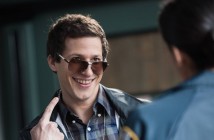Better Call Saul, Season 1, Episode 2, “Mijo”
February 9, 2015, 10:00 p.m. (EST), AMC
Michelle MacLaren is absolutely fantastic. It’s early yet for the sentiment to mean much, but I imagine months from now, it will still hold true that “Mijo” is one of the best directed episodes of 2015. Watch how she opens with quick cuts, of what we aren’t yet sure. It’s evocative, pulling you into the episode, making you palpably curious about where we are and what we are seeing. Pay attention to how she pulls back during that fantastic sequence in the desert, how she shoots Jimmy’s awakening frenetically, but then lets that long sequence where he talks two men from death sentences to a broken leg each stand on its own as the piece of powerful speechmaking it is. Look at how she shoots the date sequence in such a way as to put you right in Jimmy’s head, as he tries to focus on the good, but can’t quite shake the trauma of what he’s just endured. Appreciate that montage, where Jimmy tries valiantly to be the better version of himself, until a cup falls over, as if to tell him all his efforts are for naught. It isn’t clear yet whether Better Call Saul has much to offer in the way of new tricks, in terms of things we haven’t already seen Breaking Bad do, but if this is what old tricks can look and feel like, then sign me up. MacLaren uses every trick at her disposal to make “Mijo” visually distinctive and completely engrossing. And while it sometimes resembles just another episode of Breaking Bad, it also sets itself apart, just enough and in just the right ways, to convince me this show may have things to say on its own.
That sequence in the desert is what gives me the most hope here tonight. We’ve seen Walter White talk his way out of any number of situations like this, and it could have felt like Better Call Saul was repeating its predecessor’s tricks here, but it doesn’t. Jimmy ping-pongs from the truth (he’s a lawyer caught up in an honest mistake after a dishonest deed) to an elaborate lie (he’s Special Agent Jeffrey Steele, the “tip of the spear” on Operation Kingbreaker), but all the time, one thing stays consistent: Jimmy McGill is pragmatic. He isn’t above lying or cheating, he isn’t above bending the rules or breaking the laws. He’d like, at this point at least, to stay on the right side of the law, and to do the right thing even if it means risking his own life. But when push comes to shove, he will cross the line. He will do what is necessary.
Except, that has its limits. Jimmy could easily have walked off and left his co-conspirators to die. In fact, it would have been the easier thing to do, and maybe the smarter one (I don’t for a second trust these two not to screw Jimmy over in the future, by talking to the wrong person at the wrong time). He could have tied up loose ends and just walked away. But he didn’t. He stayed to fight for his “clients,” he stayed to save their lives, to keep them from being harmed more than was absolutely necessary. He’s pragmatic about this, as well; he sees that they aren’t walking away unscathed, so he decides to bargain over how scathed they will be instead. Yet though Jimmy McGill is no stranger to a short cut, he doesn’t take one here. In his conversation with Chuck, he promises he is not backsliding, not becoming Slippin’ Jimmy again. And in “Mijo,” we really do see Jimmy trying to be better than he has been, trying to make the best of his situation and do the right thing at the same time.
Jimmy McGill wants, more than anything, to stand for something. He wants to be a good man. This sly inversion is what, in the end, might save Better Call Saul from being a pale imitator of its predecessor. Where that series is about a man giving in to his worst impulses, this could be the story of a man who fails to live up to his better angels. Because wanting to be good is never enough. Everyone, at some point or another wants to be good. Everyone likes to go to sleep at night convinced they are a good person, to wake up each morning believing they will do good in the world. Everyone fashions themselves a good person, even if the facts say otherwise. People can rationalize a whole lot. They can rationalize almost anything. But rationalization, while it might help you sleep easier, does not make what you convince yourself true.
Being good takes work, real work, hard work, the kind of work you have to do every day. It means taking the higher road, struggling when you don’t have to, denying yourself things you want, and forcing on yourself choices you’d rather not make. Being good isn’t easy, and it is certainly more difficult than seeming good, even to yourself. That montage tonight, as Jimmy goes through the motions, one $700 trial at a time, that is what it looks like to be good. It isn’t glamorous, and there is no promise of reward. It isn’t easy, and there is no guarantee it will ever get easier. It is just putting your nose to the grindstone and doing what has to be done.
When Nacho shows up at Jimmy’s office and offers to cut him in on a scheme to rob the Kettleman’s, everything suddenly comes into focus. Jimmy says no; he’s a lawyer, not a criminal. He’s willing to be pragmatic, but he isn’t willing to hurt people, not even bad people. He isn’t willing to break the law just to get ahead. We all know how this story ends. Being good is hard, breaking bad is easy. The road to hell is paved with good intentions. Jimmy McGill wanted to be a good lawyer, to fight for fairness and justice in the world, to prove to his brother he was more than Slippin’ Jimmy. The high road is steep, rocky, and difficult. The easy road calls to us, promises rewards beyond measure, comforts us that it won’t take much to assuage our worries. It’s a lifetime of shitty courthouse coffee and $700-a-trial checks, or a phone call that could make him $100,000. Which would you take? Could you keep making that harder choice, day after day, courthouse coffee after courthouse coffee? And how would you sleep if you made that call? Would it keep you up at night? Or would you sleep better, knowing your days of crashing on a pull out couch in your office, waking up to that terrible coffee might be almost at an end? Being good isn’t easy; it’s hard, and its painful, and its every day. What’s one phone call, after all? Who’s it going to hurt? Take the easy road for a while. Rest up. You can always find your way back to the high road once you’re feeling stronger. Right?
The Roundup
- “Why jump to the nuclear option? I’m saying keep it simple.”
- “Guys, I’m a lawyer! I passed the bar! Ask me anything! Not contract law, but…”
- “The taskforce is designated Operation Kingbreaker, so…” “Kingbreaker? That makes me the King!”
- “You are the worst lawyer ever!” “Hey, I just talked you down from a death sentence to six months’ probation. I’m the best lawyer ever.”
- “This represents a good thing. I’m not backsliding. This isn’t Slippin’ Jimmy.”
- “Hey, look. I’m a lawyer, not a criminal.” “You are shitting me.”
- “For when you figure out you’re in the game.”
In “Mijo,” we really do see Jimmy trying to be better than he has been, trying to make the best of his situation and do the right thing at the same time.
-
GREAT




